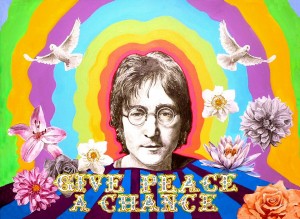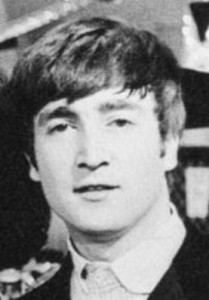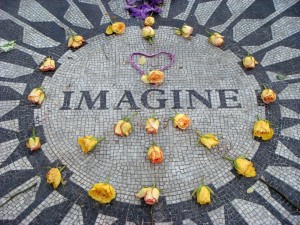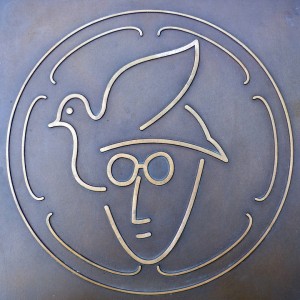‘Part of me suspects that I’m a loser, and the other part of me thinks I’m God Almighty’.
John Lennon was, with Paul McCartney, one half of the greatest song writing duo in history, and one quarter of the greatest bands in history: the Beatles (as very rare examples of absolute facts these, perhaps, represent the only time when Middle Way notions of provisionality, incrementality and agnosticism do not apply). Nevertheless, some would also have you believe that Lennon was a peace-loving, feminist icon who fought for the rights of the disenfranchised and the oppressed. A man who declared that ‘all you need is love’ and dared to Imagine a world without war, nationalism or religion. Others present him in an altogether different hue: as a violent, jealous and chauvinistic bully who abused his first wife, Cynthia and emotionally neglected his first son, Julian. On one hand we have Lennon the hero and on the other we have Lennon the villain and in many cases he is presented as either/or, with commentators unable, or unwilling to negotiate this juxtaposition. Sometimes, biographical accounts will even skim over, or ignore these conflicting characteristics entirely and instead focus solely on his musical career. I remember watching a biographical documentary which, apart from briefly referencing his peace activism (and judging it to be an immature and naive embarrassment) did exactly that.
‘When you talk about destruction, don’t you know that you can count me out… in’.
There’s a tendency to dehumanise those whom we cast as heroes or villains, creating one dimensional figures to be loved or reviled. This tendency is apparent with the treatment of exceptional individuals throughout history, such as Saints, military heroes and political activists. The recent rise of the celebrity (a term which often invites scorn, but is actually an umbrella term covering people with a wide range of skills and achievements, like Elvis Presley, Princess Diana or anyone who appears in any reality TV program) has provided  another category. There clearly seems to be a need for us to create simplified archetypes and doing so does appear to be useful, but to do this with historical people that have lived (or are still alive) can deny us a richer understanding of their, and consequently our own, humanity (and can also create real dangers, as chillingly demonstrated by the recent case of Jimmy Savile).
another category. There clearly seems to be a need for us to create simplified archetypes and doing so does appear to be useful, but to do this with historical people that have lived (or are still alive) can deny us a richer understanding of their, and consequently our own, humanity (and can also create real dangers, as chillingly demonstrated by the recent case of Jimmy Savile).
‘Well, you know that I’m a wicked guy
And I was born with a jealous mind’.
Lennon’s lyrics often seem like raw, unguarded confessions that reek of insecurity and contradiction. He seemed to be keenly aware of the conflicting aspects of his personality and didn’t shy away from exploring them in the material he released. He acknowledged both the good and the bad; the hero and the villain. While he declared that ‘all you need is love’, he also put to song the disturbing words ‘baby I’m determined and I’d rather see you dead’. Filling the space between these two extremes was a Scared, Jealous Guy who felt in serious need of Help! A perfect example of this uneasy juxtaposition can be found on the Imagine album. As well as featuring the well-known title track, which has become something of a secular hymn, it also contains the track How Do You Sleep?, a venomous attack on his former writing partner and friend, Paul McCartney, which couldn’t be any further from the sentiments expressed in Imagine.
‘Hatred and jealousy, gonna be the death of me
I guess I knew it right from the start
Sing out about love and peace
Don’t want to see the red raw meat
The green eyed goddamn straight from your heart’.
He admitted that he had been physically abusive to women – not just Cynthia – and that he had not been a very good father to Julian. He admitted that he was a bully. He also described his own experiences of childhood abandonment and later feelings of fear and insecurity, which he concealed behind a mask of buffoonery and violence. Not that this excuses the behaviour of a grown man, but it does provide us with some sense of a complex human being. Add to that his later promotion of pacifism, feminism and social justice and the asymmetrical mosaic grows greater still. In the later years of his life he became a devoted parent to his second son, Sean – with whom he seemed able to attain some sense of atonement. Unfortunately, his relationship with Julian remained strained and distant. Maybe the old wounds would have healed, had he not been shot and killed at the age of 40, but perhaps his earlier behaviour had been too damaging.
‘I really had a chip on my shoulder … and it still comes out every now and then’.
There are those that might cry ‘hypocrite’ at such apparent contradictions, but that would be over-simplistic and unfair. It’s quite possible for Lennon to have been all of these things over time (or even simultaneously), with some characteristics perhaps being the consequence of another. For instance, it’s likely that his feminism grew, in part, out of a need for redemption. That’s not to say, then, that the villain of the piece was defeated; forever to be vanquished by the upstart hero and his eye shatteringly shiny armour. No, far more likely was that the two existed side by side in an on-going (and probably uncomfortable) process of conflict and negotiation. Acknowledging someone’s flaws does not necessitate that one question the sincerity of their strengths.
‘Although I laugh and I act like a clown
Beneath this mask I am wearing a frown
My tears are falling like rain from the sky
Is it for her or myself that I cry’?
 A minor deviation here, but I would like to comment on the supposed naivety and immaturity of Lennon’s political views. First of all, I feel that this is a misrepresentation of what he actually said. If we look at the two main points that critics tend to pick up on: the invitation to imagine everybody living in peace and the request to give peace a chance. Both of these notions seem far from naïve to me, in fact they seem like reasonable suggestions for incremental change. There is clearly no unrealistic demand for overnight change; just a suggestion that we consider an alternative way of conducting ourselves, with the hope that things might start to get better. In the UK similar accusations are levelled at Jeremy Corbyn, and they grate with me for the same reasons. I’m not suggesting that anyone has to agree with either Lennon or Corbyn, but the condescending disregard of their, perfectly valid, views strikes me as being unnecessary and spiteful. Secondly, the generalised criticisms of Lennon’s political views assume a fixed ideology that just doesn’t seem to have been present. He changed, altered and evolved his ideas all through his life, and was often critical of things that he had previously said or done.
A minor deviation here, but I would like to comment on the supposed naivety and immaturity of Lennon’s political views. First of all, I feel that this is a misrepresentation of what he actually said. If we look at the two main points that critics tend to pick up on: the invitation to imagine everybody living in peace and the request to give peace a chance. Both of these notions seem far from naïve to me, in fact they seem like reasonable suggestions for incremental change. There is clearly no unrealistic demand for overnight change; just a suggestion that we consider an alternative way of conducting ourselves, with the hope that things might start to get better. In the UK similar accusations are levelled at Jeremy Corbyn, and they grate with me for the same reasons. I’m not suggesting that anyone has to agree with either Lennon or Corbyn, but the condescending disregard of their, perfectly valid, views strikes me as being unnecessary and spiteful. Secondly, the generalised criticisms of Lennon’s political views assume a fixed ideology that just doesn’t seem to have been present. He changed, altered and evolved his ideas all through his life, and was often critical of things that he had previously said or done.
‘My role in society, or any artist’s or poet’s role, is to try and express what we all feel. Not to tell people how to feel. Not as a preacher, not as a leader, but as a reflection of us all’.
 While I probably wouldn’t go so far as to put Lennon forward as a Middle Way Thinker, I do think he provides a good example of how a Middle Way approach can be useful in the consideration of those whom we admire… and those we do not. Gandhi (who has featured in Robert M Eillis’ Middle Way Thinker series) could, with some justification, be accused of misogyny and racism, but that doesn’t take away from his achievements or the legacy he left behind. The medieval Saints of Europe become figures of greater interest and inspiration when their multi-dimensional and flawed humanity can be glimpsed beneath their holy veneers (a principle that, I have recently discovered, can be applied to Jesus too). Of course, such figures need not be well known. We also create heroes and villains in our day to day lives too; looking up to, or down upon family members or colleagues, for instance. If we can recognise the messy middle from which others are composed and accept that people can be both good and bad, in different measures, at different times, then this might just enable us to become more open to those around us and more accepting of ourselves. This sounds easy on paper, but can be difficult to achieve in practice. I, for one, have a long way to go but the closer I look, the more complicated the picture becomes and the easier it gets.
While I probably wouldn’t go so far as to put Lennon forward as a Middle Way Thinker, I do think he provides a good example of how a Middle Way approach can be useful in the consideration of those whom we admire… and those we do not. Gandhi (who has featured in Robert M Eillis’ Middle Way Thinker series) could, with some justification, be accused of misogyny and racism, but that doesn’t take away from his achievements or the legacy he left behind. The medieval Saints of Europe become figures of greater interest and inspiration when their multi-dimensional and flawed humanity can be glimpsed beneath their holy veneers (a principle that, I have recently discovered, can be applied to Jesus too). Of course, such figures need not be well known. We also create heroes and villains in our day to day lives too; looking up to, or down upon family members or colleagues, for instance. If we can recognise the messy middle from which others are composed and accept that people can be both good and bad, in different measures, at different times, then this might just enable us to become more open to those around us and more accepting of ourselves. This sounds easy on paper, but can be difficult to achieve in practice. I, for one, have a long way to go but the closer I look, the more complicated the picture becomes and the easier it gets.
‘We all have Hitler in us, but we also have love and peace. So why not give peace a chance for once’?
Songs Quoted (In Order of Appearance)
All You Need Is Love (Lennon-McCartney, 1967)
Revolution (Lennon-McCartney, 1968).
Run For Your Life (Lennon-McCartney, 1965).
Scared (Lennon, 1974).
Loser (Lennon-McCartney, 1964).
Pictures (In Order of Appearance)
Lennon Memorial Plaque, courtesy of Pixabay.com.
John Lennon Beatles Peace Imagine, courtesy of Pixabay.com.
The Beatles & Lill-Babs 1963, courtesy of Wikimedia Commons.
Imagine John Lennon New York City, courtesy of Pixabay.com.


Great post, Rich. John Lennon is definitely one of my heroes, perhaps in part because of his flawed nature and how honest he was about his many imperfections. I lack the courage he had to be as open about my own flaws. However, isn’t the ‘problem’ of John Lennon, the problem we all face, that of recognizing and working with our demons?
Thanks Barry,
It is rare for someone in the public eye (or anywhere, really) to be so open and honest, he’s almost the definition of ‘wearing your heart on your sleeve’. It’s one of the things that I admire most about him, and it makes his lyrics very distinctive. The urge to only show our better side, and pretend (even to ourselves) that any negative characteristics don’t exist, is a strong one. Although there is still a pressure on men to hide there feelings today, this was much stronger in the 60’s and 70’s. In this, as with music, Lennon was a pioneer.
I think the ‘problem of John Lennon’ is a useful metaphor for the contradictions present in all of us. I suppose that he could be seen as an archetype for the internal conflicts we all experience. He stated that Hitler is present in all of us, but so too is John Lennon.
You’re right. It’s a great metaphor and I’ll use it in future. Your last sentence reminded my of the following quote by Solzhenitsyn:
If only it were all so simple! If only there were evil people somewhere insidiously committing evil deeds, and it were necessary only to separate them from the rest of us and destroy them. But the line dividing good and evil cuts through the heart of every human being. And who is willing to destroy a piece of his own heart?
As for men hiding their feelings in the 60s and 70s (and in the 30s, 40s and 50s for that matter), it’s been my personal experience that men didn’t hide their feelings, they expressed them in anger (including violence to the person including/especially children), sadistic punishment and other bullying behaviours, ridicule, belittlement, humiliation, sexual assault, and sometimes in sullen hostile silence.
It’s true that men didn’t commonly talk about their feelings, but obscenity offered a kind of release, and contact sports for those that enjoyed participation or spectating.
I can’t comment on the Beatles. In my own springtime popular music (Alma Cogan, Tommy Steele, Lonnie Donogan) was something one had generally outgrown by the time one was in one’s early twenties. Work and getting married were one’s prime concerns. PTSD (as yet ‘undiscovered’) cast a long shadow over post-war family life, and the welfare and education of children, in the late 40s and 50s).
Hi Peter,
I think Lennon, throughout the 60’s, was a prime example of this type of masculine behaviour, which included violence and abuse. However, I think that this was a result of them not exploring their feelings in a meaningful or honest manner. It was a repression of feelings like fear, which caused the anger and lead to abusive behaviour. This process results in the individual exploring, and acting upon their anger, while ignoring the more complex and nuanced emotions that were buried beneath. Therefore, many men from this period existed in a cycle of violence that was never resolved. Man feels angry, man lashes out, anger is temporarily released until man feels angry, man lashes out, and on it goes. Any other emotions, which were declared to be too feminine for real men to experience, remained unchallenged and unresolved. I would guess that the shadow cast over family by post-war PTSD is a manifestation of the (albeit simplistic) cycle described above, although I don’t feel I know enough to say for sure.
Hi Rich, I don’t think your description of repressed emotion is simplistic, and – although I can’t speak authoritatively on the history of emotional expression – I don’t recall emotions being discussed during my years of nurse-training except once, when we were shown a ‘new’ (and very controversial) fly-on-the-wall film made by John Bowlby in 1952 and shot at a children’s hospital somewhere in London: a ‘study of maternal deprivation’. It was called “A Two-Year Old Goes Into Hospital”. In the 1950s it was commonplace for parents to be strongly discouraged from visiting sick children in hospital, as visits “caused unnecessary distress”. Nurses were taught this, and saw that the policy was implemented.
Not only men, but women too, had a powerful aversion to signs of emotional, and repressed them. Women might weep silently, but not in the presence of their husbands. A mother comforted her hurt child with the words “There, there….don’t cry”. I think it is a very modern notion that the discussion of personal feelings, or the encouragement of emotional expression, is of some mental-health value; and my own thoughts in the matter are mixed and uncertain. As the Way proposes, it’s all about conditions………:)
Concise piece which raises pertinent points about philosophy and impact of maturing years- sadly cut short.
Would be interested to see further analysis of Jeremy Corbyn as a middle way thinker!
Hi Sally,
Welcome to the site and than you for your comments.
I think Corbyn has demonstrated much that is compatible with Middle Way Philosophy. A good example is his recent speech at the Glastonbury festival, where he passionately argued for greater promotion and encouragement of artistic pursuits in people of all ages. This shows a recognition that the distinctions which are often placed between ‘sciences’ and the ‘arts’ (especially in schools, where the former – alongside English – is valued more greatly than the latter) are not really so well defined. That for us to become well rounded individuals who can effectively develop and integrate emotional/ creative thinking with logic, reason and critical thinking we are best placed to have an education (throughout life) that includes a healthy balance of subjects.
There are signs that Corbyn can be dogmatic but he also seem to be able to hold his views provisionally and acknowledge an incremental approach, as he has shown with his recent handling of the issue of the Trident Nuclear deterrent. He clearly has strong (and some might argue dogmatic) opinions on this, but has shown an ability to compromise. It is still early days and a full assessment will not be possible for some time. Like anyone, he is flawed, but he seems to have the potential to become a highly influential figure, who changes British politics for the better and inspires people for generations to come. The ball is his (and the Labour Party’s and the Medias) court.